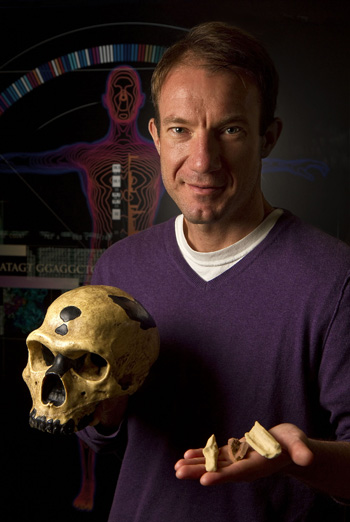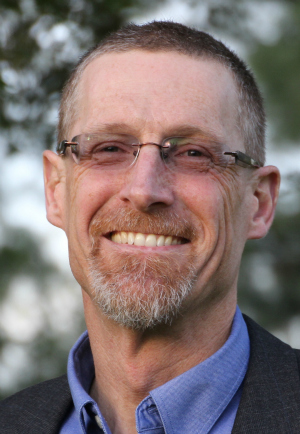Campus News
UC Santa Cruz innovators recognized for impact at 2024 Santa Cruz Works Titans Awards
Two UC Santa Cruz faculty members, Richard (Ed) Green and Chris Benner, have been selected as awardees for the eighth annual Santa Cruz Works Titans Awards

UC Santa Cruz professor of biomolecular engineering Ed Green

Two UC Santa Cruz faculty members, Richard (Ed) Green and Chris Benner, have been selected as awardees for the eighth annual Santa Cruz Works Titans Awards, which recognize outstanding individuals who have made significant contributions to the local tech and entrepreneurial community.
Santa Cruz Works, a non-profit organization focused on connecting industry professionals and expanding local startups, will honor the awardees at a ceremony on January 15, 2025 at the Kuumbwa Jazz Center.
Pioneering paleogenomics and forensic genomics
Ed Green is a professor of biomolecular engineering at the Baskin School of Engineering, director of UCSC QB3, and co-principal investigator of the UC Santa Cruz Paleogenomics Lab. Santa Cruz Works named Green a “visionary scientist and entrepreneur,” recognizing his advancements in DNA technologies and his role in founding local startups and mentoring aspiring entrepreneurs.
Green’s research has uncovered groundbreaking insights into human evolution, including the genetic exchange between early modern humans and Neanderthals. He was a key contributor in the Nobel-Prize winning Neanderthal Genome Project, collaborating with Nobel laureate Svate Pääblo to sequence and compare the genomes of Neanderthals, Denisovans, and modern humans.
As the faculty director of UCSC QB3, a nonprofit research and technology institute, Green supports researchers, graduate students, and postdocs to transform research into impactful startups and collaborate with industry partners.
Green has also developed several successful startups of his own, contributing to the rich ecosystem of bioengineering entrepreneurship in Santa Cruz. Originally founded at UCSC, Dovetail Genomics, now part of Cantata Bio, enables researchers and clinicians to solve complex scientific problems through advanced genomic approaches. Another local company founded by Green, called Claret Biosciences, focuses on next-generation sequencing technologies to analyze degraded DNA for applications such as cancer research.
Green developed a breakthrough method for sequencing DNA from rootless hair to identify human remains, a task once deemed impossible, leading to the resolution of numerous cold cases. He achieved this as co-founder and scientific advisor of Astrea Forensics, which uses new technologies to advance forensic DNA analysis and solve complex cases..
Advancing equity and economic opportunity
Environmental Studies and Sociology Professor Chris Benner is the Dorothy E. Everett Chair in Global Information and Social Entrepreneurship, director of the Institute for Social Transformation, and director of the Everett Program for Technology and Social Change. The Santa Cruz Works Titans Awards recognized Benner for his “groundbreaking work champion[ing] equity and economic opportunity by reshaping narratives and policies to highlight collaboration and mutuality.”
Specifically, the award recognizes the Solidarity Economics framework that Benner co-developed to challenge neoliberal norms and the application of Solidarity Economics to “transformative initiatives” like the Salinas Inclusive Economic Development Initiative, the state-wide Community Economic Mobilization Initiative, and California’s $600 million Jobs First program. Santa Cruz Works credits Benner’s contributions to these programs with “fostering justice, innovation, and impact.”
Benner has taught at UC Santa Cruz since 2015. He originally received his Ph.D. in City and Regional Planning from UC Berkeley and went on to become a leading scholar of the relationships between technological change, regional development, and the transformation of work and employment. He approaches these issues with a special focus on equity and environmental justice, informed by his background in community-based advocacy and research.
Benner has conducted extensive applied policy work related to workforce development, inclusive economic development, and strategies for promoting regional equity. He has also authored or co-authored eight books and more than 100 academic journal articles, chapters, and research reports. Journalists often seek his commentary on how to improve economic well-being, health, and sustainability in communities and how emergent technologies may impact “the future of work.”